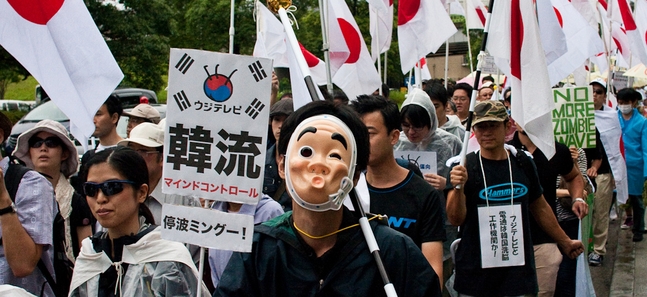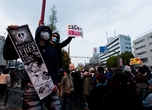
Posted: Mon Aug 22 2011
Now showing 1 of 25 | Next ►
When actor Sosuke Takaoka complained on Twitter last month that the glut of Korean dramas on Fuji TV had made the channel unwatchable, he probably should have guessed that the comments would get him in trouble with his talent agency. What he might not have expected is that they would ignite a popular protest movement.
While the Pacchigi! star (today more famous for being Aoi Miyazaki's husband) was summarily ditched by his agency, others have taken the idea and run with it. Yesterday, thousands of people marched through the streets of Odaiba, the home of Fuji TV's headquarters, to protest against the channel's perceived Korean bias. Organisers claimed a turnout of 6,000 for the demonstration, which followed an unofficial march held on August 7, and gave vent to a burgeoning community of online dissent.
More than any other channel, Fuji TV has been an enthusiastic champion of the so-called Korean Wave, devoting three hours of every weekday afternoon to imported TV dramas. As Philip Brasor pointed out in his insightful Media Mix column in yesterday's Japan Times, there's a good reason for this: it's cheap. Yet in the eyes of others, it's indicative of something much more sinister – a threat to the very independence of Japan's media.
As with many movements that are still in their infancy, the Fuji TV protests seemed to attract a wide range of interest groups. There were the nationalists, of course. When we arrived at the company's headquarters, a small group of men in blue jumpsuits were attempting to get past the security guards stationed outside the building, although it seemed like a largely symbolic exercise. Elsewhere, we spotted prolific conservative activist Kazuo Miwa and Toshio Tamogami, the former Air Self-Defense Force chief of staff who was sacked in 2008 for his revisionist views of Japanese wartime aggression.
However, the crowd was both far larger and more diverse than you'd expect at the average far-rightist hoedown, with people ranging from their teens to their 60s or older. Amidst the sea of hinomaru Japanese flags, you could find placards denouncing media bias and the perceived encroachment of foreign interests, in terms that would make a Tea Partier smile. One popular talking point is the 28.59% of Fuji TV's shares that are held by foreign stockholders. Another, more bizarrely, is the claim made on variety show Waratte Iitomo! that kimchi nabe is the most popular form of hotpot in Japan – all a big stitch-up, apparently.
A small portion of the crowd were obviously crackers. A 67-year-old woman started talking to us in English, explaining that she first got involved in the protest movement because of North Korea's abduction of Japanese citizens. She went on to explain that China and North Korea controlled the Japanese media, that 90% of crime in Japan was committed by nationals of those two countries, and that she had DPRK spies living next to her house who burgled her three times a day.
Others we spoke to espoused some more level-headed opinions. One man said that his problem wasn't just with Fuji TV, but television in general, and that the sooner we got away from a system in which millions could sit absorbed in the same programs, the better. Another cited some familiar arguments, bemoaning Japan's declining status in east Asia, and questioning the promotion of other countries' culture at the expense of its own. He echoed the view that the problem wasn't simply with Fuji TV, and said that he preferred to obtain his information via the internet and from independently produced leaflets.
'As you can see, this is patriotism, not narrow-minded nationalism,' said Kobo Inamura, a visiting professor in Public Policy at Chuo University. We're not so sure. Yet it's hard to imagine a demonstration such as this attracting anywhere near as many people had it happened before March 11. Like a looking-glass version of the anti-nuclear demos that we've seen in Tokyo since then, the Fuji TV protests seemed like an attempt to articulate a deeper sense of malaise, powerlessness and existential doubt.
But then again, some people really do just hate Korean dramas.
Now showing 1 of 25 | Next ►
Tweets
- About Us |
- Work for Time Out |
- Send us info |
- Advertising |
- Mobile edition |
- Terms & Conditions |
- Privacy policy |
- Contact Us
Copyright © 2014 Time Out Tokyo







































Add your comment